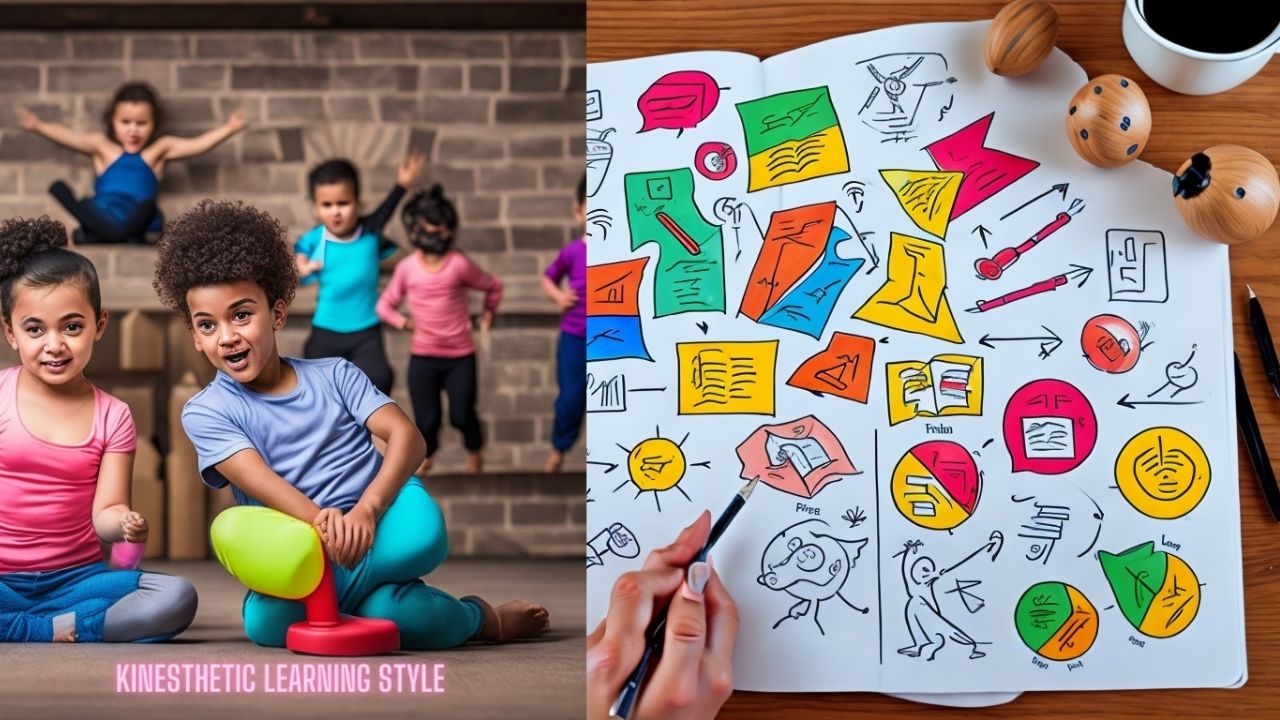Kinesthetic Learning Style: Understanding, Examples, and Implementation

Kinesthetic Learning is an educational method that engages the senses to absorb information more effectively and retain it for long-term memory. This learning style focuses on using physical movement to engage the mind and reinforce the linking of physical and cognitive activities.
In other words, Kinesthetic learning is a learning style that involves physical activity and movement. It is often referred to as “hands-on” learning, and is one of the three main learning styles, alongside visual and auditory learning. In this post, we will explore the kinesthetic learning style, provide examples and illustrations, discuss methods and techniques used, and offer practical tips for implementation.

Understanding Kinesthetic Learning Style
Kinesthetic learners prefer to learn through physical activity and movement. They often enjoy hands-on experiences and learn best when they can touch, feel, and manipulate objects. Kinesthetic learners tend to be active and energetic and may struggle with traditional classroom settings that require sitting still and listening for long periods of time.
Examples and Illustrations

Kinesthetic learners process information best by actively engaging with it. They prefer hands-on activities and tasks that allow them to explore the material in physical and tangible ways. A classic example of kinesthetic learning is playing a sport or game. Kinesthetic learners don’t just study the rules or watch a game, they jump right in and use their bodies to learn by doing.
Some examples of kinesthetic learning include:
- Building models or structures
- Participating in role-playing activities
- Engaging in physical activities such as sports or dance
- Performing experiments or demonstrations
- Using manipulatives such as blocks or puzzles
- Taking notes while walking or pacing
- performing a mock trial,
- taking a walk while listening to an eBook,
- Constructing models of different geometrical shapes.
These activities allow kinesthetic learners to engage with the material in a way that is meaningful and memorable for them.
Methods and Techniques

Kinesthetic learners often find success when working with teachers or tutors who make use of tactical learning methods. Painting, sculpting, acting, reciting poetry, drawing, collaging, and performing, all help these learners to understand and internalize learning there are many methods and techniques that can be used to support kinesthetic learning, including:
- Incorporating movement into lessons, such as having students act out a story or dance to a song
- Providing hands-on activities and manipulatives, such as building blocks or puzzles
- Encouraging note-taking and doodling during lectures or discussions
- Using technology to engage kinesthetic learners, such as interactive whiteboards or virtual reality simulations
- Providing opportunities for physical activity and movement breaks throughout the day
- Actual practice on the task being learned – Kinesthetic learners will gain the most benefit from hands-on activities. •
- Using a movement break, wherein they are allowed to stretch and move around – This will help keep them engaged and excited about what they are learning.
- Making use of the environment – When possible, have learners take a walk while listening to an eBook, or have them work together to build a model of what they’re learning.
These techniques can help kinesthetic learners stay engaged and focused, and can improve their overall learning experience.
Practical Approach and Implementation

Nest methodologies are one the leading methods that imbibe the style of Kinesthetic Learning
It is important to engage the entire body in these activities so that learners are able to ground their memory in bodily knowledge- and to learn best. Kinesthetic learners need a teacher who allows them to physically move and apply the concepts they’re learning to a tangible item or experience.
To implement kinesthetic learning in the classroom or at home, it is important to:
- Identify kinesthetic learners and their individual needs and preferences
- Incorporate hands-on activities and movement into lessons and activities
- Provide opportunities for physical activity and movement breaks throughout the day
- Encourage note-taking and doodling during lectures or discussions
- Use technology and other resources to engage kinesthetic learners
- Create a supportive and inclusive learning environment that values different learning styles
Kinesthetic learning can be implemented in a variety of ways. Here are some tips to get started:
• –Encourage students to move around as much as possible – This could be anything from standing at their desk or chair to taking a break to do some stretching.
• Make use of tactile activities – Give kinesthetic learners a chance to learn by doing. Make use of building blocks, craft materials, and other tactile objects.
• Put technology to work – Use technology to let kinesthetic learners explore concepts and evaluate outcomes in real time.
• Offer choice – Whenever possible, have learners make their own choices so that they’re politically engaged in their learning.
CBSE Health and Physical Education Syllabus
top 20 schools in west bengal- 2022 Ranking
pocso training for teachers | pocso act in english | pocso act explained | Ideate training
cbse vs ncert | cbse aur ncert mein kya antar hai |cbse and ncert difference in hindi
CBSE Health and Physical Education Syllabus
top 20 schools in west bengal- 2022 Ranking
pocso training for teachers | pocso act in english | pocso act explained | Ideate training
cbse vs ncert | cbse aur ncert mein kya antar hai |cbse and ncert difference in hindi
Provide opportunities for creative expression – Involve students in activities such as art, music, drama, and physical education, as these are all excellent ways to get kinesthetic learners involved.
By implementing these strategies, kinesthetic learners can thrive and achieve their full
In conclusion, kinesthetic learning is an important learning style that involves physical activity and movement. By understanding the needs and preferences of kinesthetic learners, and implementing strategies and techniques that support their learning style, we can create a more inclusive and effective learning environment for all learners.
CBSE Health and Physical Education Syllabus
top 20 schools in west bengal- 2022 Ranking
pocso training for teachers | pocso act in english | pocso act explained | Ideate training
cbse vs ncert | cbse aur ncert mein kya antar hai |cbse and ncert difference in hindi
Provide opportunities for creative expression – Involve students in activities such as art, music, drama, and physical education, as these are all excellent ways to get kinesthetic learners involved.
By implementing these strategies, kinesthetic learners can thrive and achieve their full
In conclusion, kinesthetic learning is an important learning style that involves physical activity and movement. By understanding the needs and preferences of kinesthetic learners, and implementing strategies and techniques that support their learning style, we can create a more inclusive and effective learning environment for all learners.
CBSE Health and Physical Education Syllabus
top 20 schools in west bengal- 2022 Ranking
pocso training for teachers | pocso act in english | pocso act explained | Ideate training
cbse vs ncert | cbse aur ncert mein kya antar hai |cbse and ncert difference in hindi
Provide opportunities for creative expression – Involve students in activities such as art, music, drama, and physical education, as these are all excellent ways to get kinesthetic learners involved.
By implementing these strategies, kinesthetic learners can thrive and achieve their full
In conclusion, kinesthetic learning is an important learning style that involves physical activity and movement. By understanding the needs and preferences of kinesthetic learners, and implementing strategies and techniques that support their learning style, we can create a more inclusive and effective learning environment for all learners.
CBSE Health and Physical Education Syllabus
top 20 schools in west bengal- 2022 Ranking
pocso training for teachers | pocso act in english | pocso act explained | Ideate training
cbse vs ncert | cbse aur ncert mein kya antar hai |cbse and ncert difference in hindi
CBSE Health and Physical Education Syllabus
top 20 schools in west bengal- 2022 Ranking
pocso training for teachers | pocso act in english | pocso act explained | Ideate training
cbse vs ncert | cbse aur ncert mein kya antar hai |cbse and ncert difference in hindi
Provide opportunities for creative expression – Involve students in activities such as art, music, drama, and physical education, as these are all excellent ways to get kinesthetic learners involved.
By implementing these strategies, kinesthetic learners can thrive and achieve their full
In conclusion, kinesthetic learning is an important learning style that involves physical activity and movement. By understanding the needs and preferences of kinesthetic learners, and implementing strategies and techniques that support their learning style, we can create a more inclusive and effective learning environment for all learners.
CBSE Health and Physical Education Syllabus
top 20 schools in west bengal- 2022 Ranking
pocso training for teachers | pocso act in english | pocso act explained | Ideate training
cbse vs ncert | cbse aur ncert mein kya antar hai |cbse and ncert difference in hindi
CBSE Health and Physical Education Syllabus
top 20 schools in west bengal- 2022 Ranking
pocso training for teachers | pocso act in english | pocso act explained | Ideate training
cbse vs ncert | cbse aur ncert mein kya antar hai |cbse and ncert difference in hindi
Provide opportunities for creative expression – Involve students in activities such as art, music, drama, and physical education, as these are all excellent ways to get kinesthetic learners involved.
By implementing these strategies, kinesthetic learners can thrive and achieve their full
In conclusion, kinesthetic learning is an important learning style that involves physical activity and movement. By understanding the needs and preferences of kinesthetic learners, and implementing strategies and techniques that support their learning style, we can create a more inclusive and effective learning environment for all learners.
CBSE Health and Physical Education Syllabus
top 20 schools in west bengal- 2022 Ranking
pocso training for teachers | pocso act in english | pocso act explained | Ideate training
cbse vs ncert | cbse aur ncert mein kya antar hai |cbse and ncert difference in hindi
CBSE Health and Physical Education Syllabus
top 20 schools in west bengal- 2022 Ranking
pocso training for teachers | pocso act in english | pocso act explained | Ideate training
cbse vs ncert | cbse aur ncert mein kya antar hai |cbse and ncert difference in hindi
CBSE Health and Physical Education Syllabus
top 20 schools in west bengal- 2022 Ranking
pocso training for teachers | pocso act in english | pocso act explained | Ideate training
cbse vs ncert | cbse aur ncert mein kya antar hai |cbse and ncert difference in hindi
Provide opportunities for creative expression – Involve students in activities such as art, music, drama, and physical education, as these are all excellent ways to get kinesthetic learners involved.
By implementing these strategies, kinesthetic learners can thrive and achieve their full
In conclusion, kinesthetic learning is an important learning style that involves physical activity and movement. By understanding the needs and preferences of kinesthetic learners, and implementing strategies and techniques that support their learning style, we can create a more inclusive and effective learning environment for all learners.
Discover more from News 24 Media
Subscribe to get the latest posts sent to your email.


